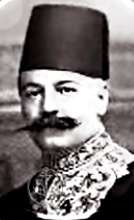Hussein Roshdy Pasha
Hussein, Pasha Roshdy (1863–1928) (Arabic: حسين رشدي باشا) was an Egyptian political figure of Turkish origin[1][2] who served as Prime Minister of Egypt between 1914 and 1919. Under pressure from British authorities, Roshdy issued a “Decision of the Council of Ministers” which essentially declared war against the Central Powers in the First World War. He was later forced to resign for failing to resolve a strike by government officials demanding mandatory recognition of the Egyptian delegation by the cabinet and the withdrawal of British sentries and guards.[3]
Hussein Roshdy Pasha | |
|---|---|
حسين رشدي باشا | |
 | |
| 11th Prime Minister of Egypt | |
| In office 5 April 1914 – 12 April 1919 | |
| Monarch | Abbas II Hussein Kamel Fuad I |
| Preceded by | Mohamed Said Pasha |
| Succeeded by | Mohamed Said Pasha |
| Personal details | |
| Born | 1863 |
| Died | 1928 (aged 64–65) |
| Spouse(s) | Eugenie Le Brun |
He was married to Eugénie Le Brun.
Notes
- Goldschmidt, Arthur (2000). Biographical dictionary of modern Egypt. Lynne Rienner Publishers. p. 169. ISBN 1-55587-229-8.
- Rizk, Yunan Labib (2000), A Diwan of contemporary life (351): Ads: Mirror and catalyst, Al-Ahram, archived from the original on 20 September 2017, retrieved 18 September 2017,
Perhaps the only exception to this phenomenon were such figures as Adli Yakan, Hussein Rushdi and Abdel-Khaleq Tharwat, all hailing from the Turkish aristocracy who never wore traditional Egyptian garb in the first place.
-
- Carman, Harry J. (Mar. 1921). “England and the Egyptian Problem”. Political Science Quarterly 36(1), 51-78.
gollark: If you don't ship the language with one it ends up as a fragmented mess.
gollark: Not in an organised way, which is the problem.
gollark: Modern languages have acknowledged and fixed this.
gollark: The C package management situation is a horrible accursed mess.
gollark: It's too late, I AM using JavaScript.
See also
| Political offices | ||
|---|---|---|
| Preceded by Mohamed Said Pasha |
Prime Minister of Egypt 1914–1919 |
Succeeded by Mohamed Said Pasha |
This article is issued from Wikipedia. The text is licensed under Creative Commons - Attribution - Sharealike. Additional terms may apply for the media files.